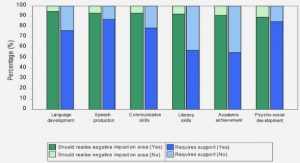Get Complete Project Material File(s) Now! »
Method
This chapter deals with various research concepts including research philosophy, research approach, available research methods and the way data is collected and will be analyzed. Using these concepts a description of how the research was conducted will be provided here.
Research philosophy
Galliers(1991) define research philosophy as a belief about the way in which data about a phenomenon should be gathered, analyzed and used. The author discussed two major research philosophies in the Western tradition of science, namely positivist also known as scientific; and interpretivist or phenomenological philosophy.
Easterby-Smith et al. (1991) explain some key features of these two philosophy paradigm alternatives in order to differentiate them. They identified positivist approach as the one in which the observer is independent, focus of research is on facts. Here the researcher formulates some hypothesis and then test them; and the preferred methods of research is usually done by taking large samples. On the other hand in interpretivist approach the observer is part of what is observed, researcher focus is on meanings, tries to understand what is happening by developing ideas and the includes investigation of small samples. Saunders, Lewis and Thornhill (2003) also supported Smith et al. (1991) by describing positivism as scientific based approach where researcher formulates a hypothesis from some theory, tests that hypothesis by experiment and then examines the results to confirm a theory or suggests for modifications. They describ phenomenologi-cal or interpretivist as a philosophy in which people experience some social phenomena in the way as they perceive.
For any sort of study we might to select among these two research philosophies. This study as it involves opinion of respondents and reflects mostly qualitative nature, using phenomenological (interpretivist) philosophy is more reasonable for it, because the data is mostly qualitative and it will be appropriate to develop ideas on that base. Hussey and Hussey (1997) identify that qualitative research takes the phenomenological philosophy because qualitative data is often rich by nature, and the gathering process is usually subjective due to the level of involvement of the researcher. Saunders et al. (2003) also explain phenomenological as a process where the researcher tries to understand what is happening and why it is happening. The phenomenological philosophy is applied in this study as the focus of research is to investigate the opinions of correspondents in selection process of Open Source ERP solutions.
Research Approach
Sekaran (2003) identifies two types of research approaches. These includes inductive and deductive. The author defined deduction as the process of arriving at reasoned conclusion by logical generalization of a known fact while induction is the process where certain phenomena is observed and conclusions are made on that basis.
In research mainly two broad methods of reasoning are referred known as deductive and inductive approaches (Burney, 2008). Deductive reasoning starts from more general to more specific, informally called top-down approach and conclusions are drawn logically from available facts; while inductive reasoning works from specific observations to broader generalizations, informally known as bottom up approach and conclusions are drawn on available facts (Burney, 2008).
Hussey and Hussey (1997) define deductive research as a study where some theoretical model is made and then is tested through empirical findings; in this way specific opinion is taken from general phrase. On the other hand in inductive research theory is formed empirical findings and in this general opinion is made from specific instances.
In this study mainly deductive approach has been used, having emphasis on identifying empirically all the rationales that influence SMEs to select Open Source ERP system. The aim is to identify all those factors that are of importance for SMEs to take into consideration while selecting Open Source ERP solutions.
Research Methods
“Research method refers to systematic, focused and orderly collection of data for the purpose of obtaining information from them, to answer a particular research problem or question” (Ghuari & Gronhuag, 2005, p.109).
The research methods are normally separated from each other according to the way the data is being collected and can be categorized as either „quantitative method‟ or „qualitative method‟. Malhotra (1996) explains quantitative research as a method which quantify the collected data and applied where study includes any statistical analysis. Quantitative research is a kind of specific research which involves large representative samples and relatively structured data collection procedures (Parasuraman, 1991).
Qualitative research involves investigating opinions, behaviors and experiences from the informant points of view. Walker et al. (2008) describe qualitative research as process to discover and explain the nature of some phenomenon and data obtained here is usually exhaustive, affluent and holistic. Quantitative research requires a huge amount of data to investigate and then conclusions are drawn on that basis. Maylor and Blackmon (2005) also illustrate that when a study includes statistical conclusion, it is appropriate to use quantitative research while if the research deals with processes that involves analyzing non-numeral information, it is better to use the qualitative approach. For this study there are limited number of respondents and we are dealing with non-numeral information in the form of respondents opinion about factors that motivate SMEs in selecting OS ERP systems.
Sedmak and Longhurst (2010) argue that researchers in the field of enterprise systems normally prefer qualitative method. One reason might be that enterprise systems is considered as a complicated subject and it is difficult to formulate any hypothesis and to test them. This research investigates the opinion of respondents, although nature of study reflects it as a qualitative method but the data collected through empirical findings will be quantified to extract the information from results which are obtained and will be used for analysis of research thereafter. This signifies that the method of research is not quantitative itself rather focus of researchers will be to use qualitative reasoning for quantifying data. Ghuari and Gronhuag (2005) explain that quantification process can be applicable in qualitative research when the intend of research is to confine the frequency of definite events.
Research Strategy
Research strategy means that which research design alternative is used for study to solve the problem. There are a number of research strategies: surveys, case study, experiment, ethnography and action research. Research strategies are similar to literary genres, indicating very broadly the style of the work like a survey, an experiment or a case study (Thomas, 2004).
Sekaran (2003) also discusses types of studies having certain nature. The author illustrates that a study may be either exploratory, descriptive, or hypotheses testing. The exploratory study is used when there is little or no information available for a situation which is to solve; it is good for obtaining a well clutch of the phenomena of the interest while the descriptive study is used when the purpose is to describe the characteristics of the variables of the interest in a situation. Parasuraman (1991) defines descriptive study as the study which is used to produce data that describes the composition of relevant group including customers, salespersons, and organizations. Studies that includes hypothesis testing in order to explain the nature of certain relationships by certain factors are known as hypothesis testing studies (Sekaran, 2003).
This study will be exploratory in nature since Yin (2003) implies that if a research is dealing with new concepts and there is not enough material available for that, then exploratory study is applicable for this.
1 Introduction
1.1 Background
1.2 Problem Discussion
1.3 Purpose
1.4 Research Question
1.5 Interested Parties
1.6 Delimitations
1.7 Outline of the thesis
2 Frame of Reference
2.1 The concept of Enterprise Resource Planning (ERP)
2.2 The concept of Open Source Software
2.3 Open Source ERP Systems
2.4 Factors that motivate SMEs to select an Open Source ERP
2.5 Concluding Framework
3 Method
3.1 Research philosophy
3.2 Research Approach
3.3 Research Methods
3.4 Research Strategy
3.5 Data Collection
3.6 Sampling
3.7 Analysis of Data
3.8 Credibility of Data
4 Empirical Findings
4.1 Results
4.2 Users (SMEs) Perspective
4.3 Suppliers (vendors/consultants) Perspectivent features or services
4.4 Open Source ERP expert’s perspective
5 Analysis
5.1 Analytical Discussion
5.2 Most important factors that motivate the SMEs to select Open Source ERP Over the Proprietary ERP
6 Conclusion
6.1 Emergent results from the study
6.2 Further Studies
References
GET THE COMPLETE PROJECT
Why Selecting an Open Source ERP over Proprietary ERP? A focus on SMEs and Suppliers perspective






